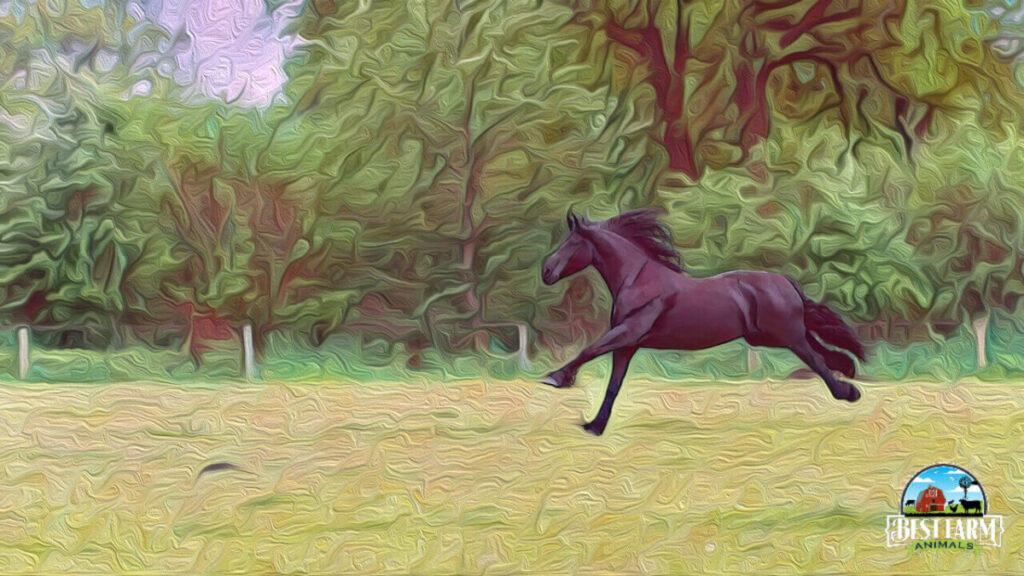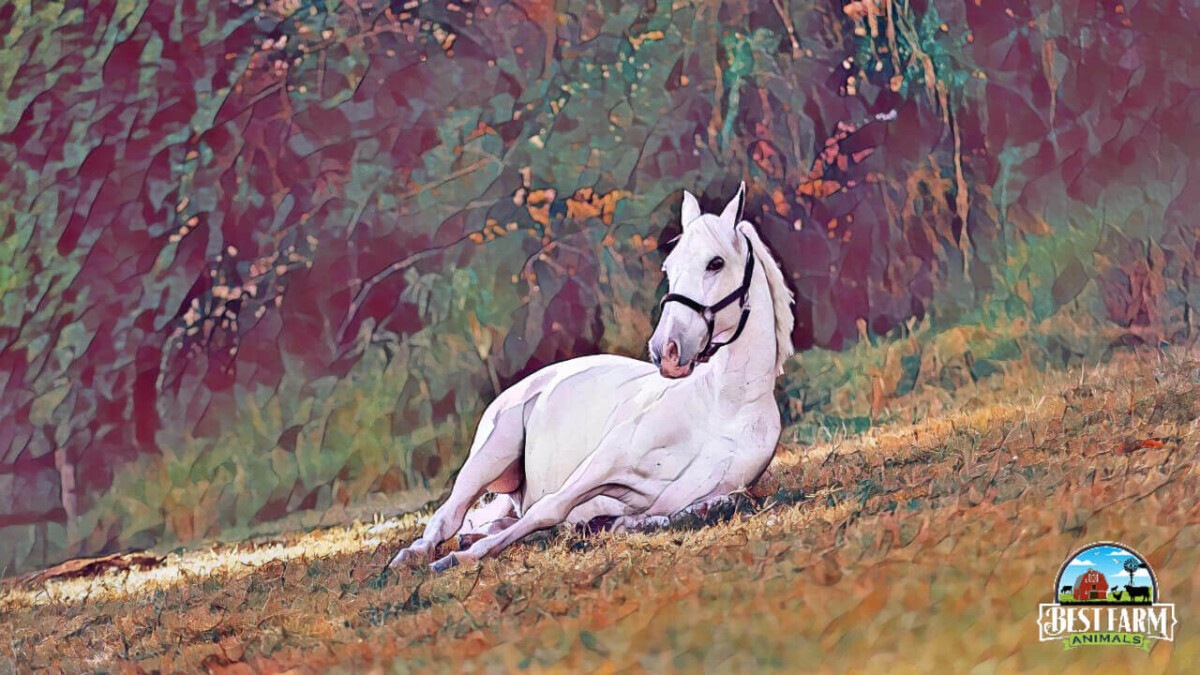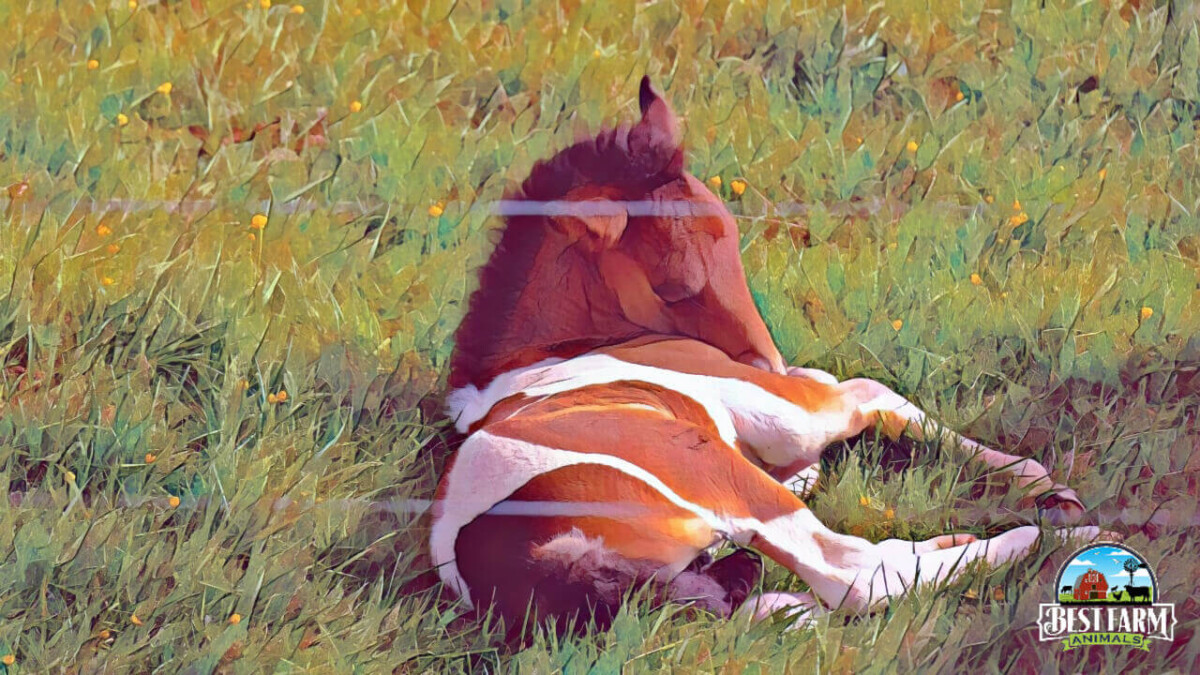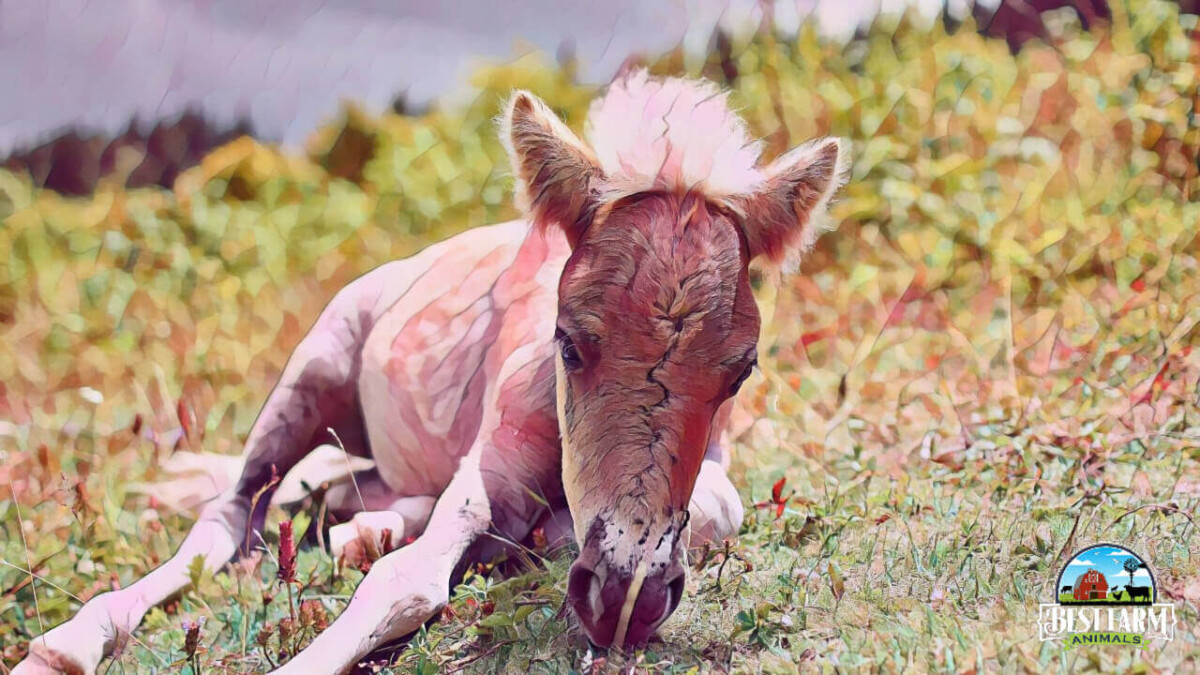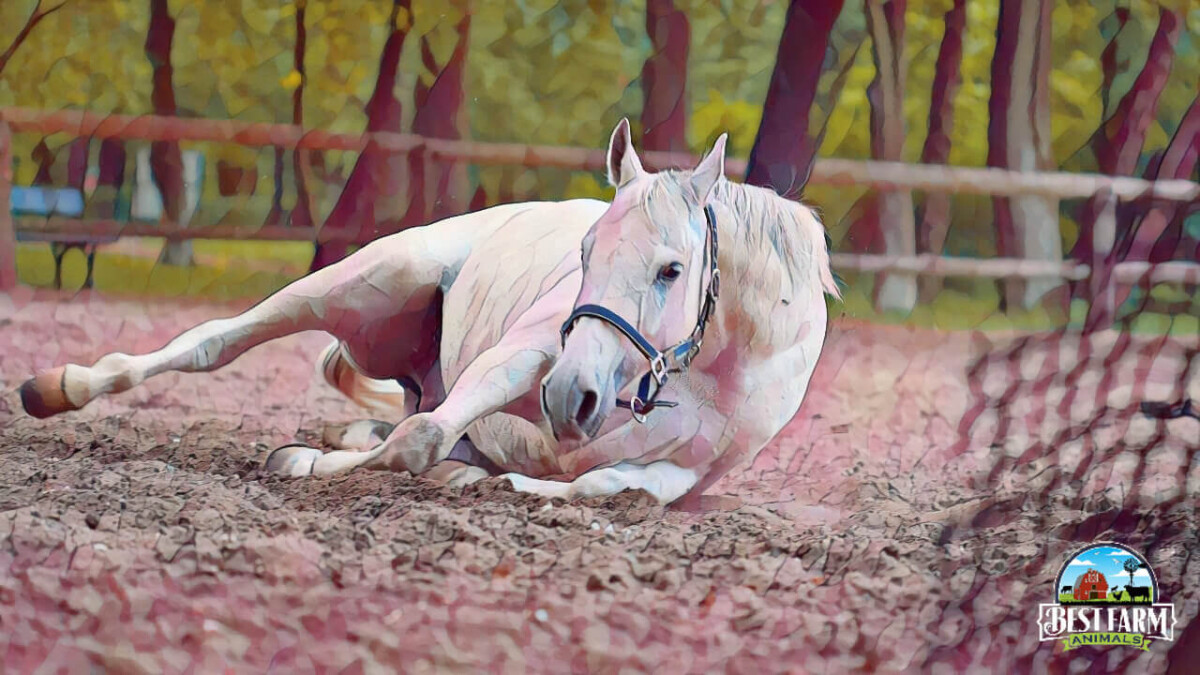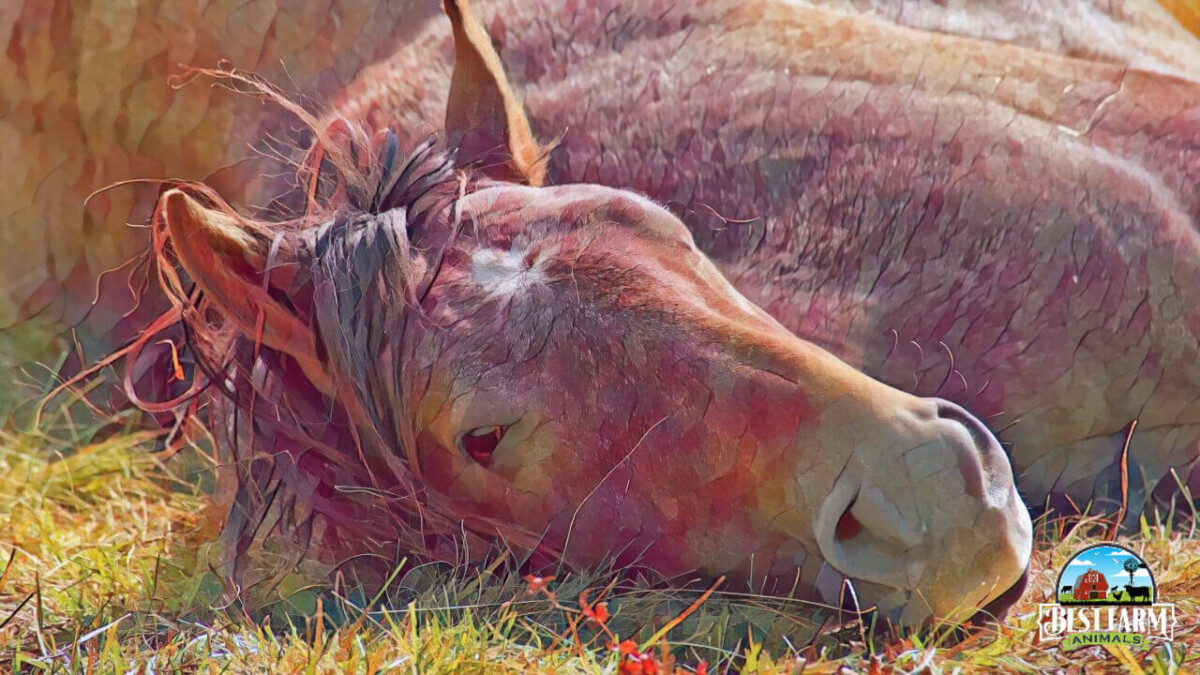One early morning, I went down to the stables to feed my horses.
My two horses were nickering and excited for breakfast, except I didn’t hear my third horse. I stuck my head over the stable door and saw he was lying down and looked very sweaty. I never used to worry and panic when my horses would lay down because I thought horses only lay down when they were sleeping, but I’ve since learned differently.
I immediately took his temperature, respiration, and pulse (TPR) and checked his mucus membranes for discoloration. His TPR was very high, and his mucus membranes were turning a pale yellow. I called my vet, who advised that if he was lying quietly, I should not disturb him and wait for her to arrive.
The vet’s diagnosis and treatment were for a viral infection, and we were thankfully able to save him. My vet explained that it is very normal for horses to lie down during deep sleep or when resting; however, it is essential always to check that the horse is happy and healthy when laying down just in case the horse is injured or unwell.
Being better informed, I now know when to worry if my horses lay down.
Why do horses lay down, and when should you worry? Horses lay down for multiple reasons, such as resting after exercise or during deep sleep.
When the horse is lying down for long periods, rolling more than usual and violently, getting up and laying down again, or if the horse looks uncomfortable, there is cause for concern. The horse could also have a fever, body pain from a musculoskeletal or tendon injury, or even colic.
When It’s Normal for Horses to Lay Down
In certain circumstances, it is quite normal for a horse to lie down, and you do not need to be concerned:
Resting And Relaxation
Some horses enjoy a good lay down and rest after exercise, the same as humans. During exercise, all muscle groups are activated. Therefore, it is vital that after exercise, a horse can recover from strenuous work and rest their muscles. When the horse returns to their pasture or stable, lying down is a great way to help the body recover and relax.
Often the horse will lay flat on the ground, stretched out, soaking up the sun in their pasture or a very comfortable stable. Stay calm if your retired or even your young horse has a good afternoon nap, as these horses will generally rest more than the fit horse.
Rolling After Exercise
It is very normal for a horse to roll after exercise. It is very relieving for them. Rubbing on the grass or sand helps dry the sweat and ease muscle cramps after strenuous work.
Deep Sleep
It is normal for a horse to lie down when they are in a deep sleep. A horse can sleep standing up due to the stay apparatus (located in the hind quarter), allowing them to stay upright and not fall over. Horses sleep throughout the day for short periods, unlike humans, who can (and should) sleep for eight hours straight.
When a horse sleeps standing up, it is generally a lighter sleep, almost like taking a quick nap. When a horse goes into a deep sleep or rapid eye movement (REM) sleep, the muscles are relaxed further while brain activity increases, which means the horse will most likely lie down since the stay mechanism disengages.
Deep sleepers, like the YouTube sleeping sensation—Squidward—have often been mistaken for being dead when they are in a deep sleep.
When It’s Not Normal for a Horse to Lay Down
When the horse is lying down for longer periods, rolling, getting up, and then lying down or being restless are causes for concern.
Colic in Horses
Colic is very serious, and you must act quickly if your horse may be colicing. A horse will lay down or roll around when they have colic to try and relieve any pain or discomfort they have in their intestines.
If the horse is lying down and repeatedly looks at their belly, you may have caught the early signs of colic. Severe cases of colic can have the horse rolling uncontrollably and throwing themselves onto the ground because of painful cramps. When this happens, the gut can become twisted and usually results in an operation to untwist the gut, but sadly, euthanasia is often the only option.
There are many types of colic, spasmodic colic, gastric colic, sand colic, and, most commonly, impaction colic. All colic types are dangerous, and when you notice colic symptoms (kicking at the belly, rolling, stretching, loss of appetite), you need to call your veterinarian immediately. Keeping your horse from lying down if they want to roll is essential to prevent a twisted gut.
Ulcers in Horses
Horses that are anxious or in a stressful environment can suffer from gastric or stomach ulcers found on the stomach lining. Symptoms of ulcers can include frequent laying down during or after meals, behavioral change (sour attitude), decreased performance, kicking or biting when doing up the girth or when working near the belly, and poor body condition.
Ulcers can cause recurrent colic, which means your horse will colic or have mild colic symptoms often within a limited time frame. You need to consult your veterinarian if you notice your horse repeatedly lying down during or after meals. A course of Gastrogard or Ulcergard (omeprazole) for the treatment of ulcers is the likely treatment recommendation.
Injuries that Cause Lying Down Behavior
Injuries such as radial nerve injury, musculoskeletal pain or injury, soft tissue damage, sore hooves, and tendon injuries can cause a horse to lie down for more extended periods. They will lie down because they cannot put pressure on the affected limb/limbs, and balancing on two or three legs can get tiring and painful.
As a horse owner, you should note any change in behavior, such as the horse laying down for too long, and consult with a vet to investigate further.
Horses are large breed animals, and if they lay down for extended periods, the weight of their body can obstruct blood flow to certain areas, which could cause internal damage and injury.
Illness in Horses That Cause Laying Down Behavior
-
Biliary
Biliary is a tick-borne illness that affects the equine liver. A medium-sized dark brown tick with reddish-orange legs (known as Rhipicephalus evertsi evertsi) as well as the small smooth stripe-legged tick (known as Hyalomma truncatum) that are both primarily found in Africa, Asia, and Europe cause the illness.
The parasite released by the tick attacks the red blood cells and destroys them, creating a high white blood cell count and a low red blood cell count, thus causing anemia that can prove fatal.
A horse suffering from biliary will be very lethargic, so the horse will tend to lie down stretched out with a high TPR. Colic is associated with biliary due to a high fever and a lack of water intake. The pain from the biliary causes colic.
-
Anemia
Anemia in horses is an illness characterized by a deficiency of red cells and hemoglobin, which creates a lack of oxygen throughout the body. Signs of anemia in horses may include poor performance, lack of energy, weakness, lethargy, loss of appetite, and depression.
Acute anemia, chronic anemia, and equine infectious anemia will cause the horse to become very lethargic and spend most of their time lying down. Because the horse’s oxygen levels are low, they will not have the energy or stamina to stand up on their own. It is imperative to contact your vet if you notice any of these signs of anemia.
-
Viral Infections Like West Nile Virus
The West Nile Virus is a virus spread by mosquito bites that causes swelling and inflammation around the brain and spinal cord. Clinical symptoms include weakness, fever, seizures, abnormal sensitivity to sound or touch, and drooling lips.
Neurological symptoms can include stumbling, falling, incoordination, partial loss or impaired movement, and sometimes complete paralysis, making the horse unable to get up after they have gone down.
The West Nile virus can cause equine encephalomyelitis (EEV), which is characterized by paralysis and other nerve damage. Both these viral infections could paralyze the horse, making them unable to get up (even with the help of humans). Once the horse becomes completely paralyzed, there is no further treatment except euthanasia.
-
Worms
Worms cause many problems in horses, such as colic, diarrhea, weight loss, starring coat, decreased performance, and topical and intestinal sores. Horses can become very sick and weak when worms are left untreated. Since the body is not getting the necessary nutrients, ulcers and colic will also become recurring problems.
As their body gets weaker, you will notice the horse will spend more time lying down. The horse will become lethargic and have no energy. If you notice any of the symptoms regarding worm infestation, you need to get a fecal matter egg count done by your veterinarian and treat your horse accordingly.
All You Ever Wanted to Know About Horses Lying Down
I sometimes still panic when I see my horse lying down, especially during the day. We often forget that our horses also like to take naps and chill out when in the pasture or stable.
Since I regularly get asked questions about this by other horse owners, I’ll include some of the most relevant answers.
When Should You Worry About Your Horse Lying Down?
If the horse is lying down and looks like it might be in pain, has an increased heart rate, faster respiration, high temperature, is sweating a lot, trying to roll, or looking at the belly, there is cause for concern. The horse may be colicing or has a virus.
You can be concerned if the horse is battling to stand up again, as this could mean the horse has injured itself or is very weak due to an illness.
Is It Normal and Safe for Horses to Lie Down?
It is entirely normal for a horse to lie down; however, if the horse is lying down for a long time, you may need to investigate further, as the horse could be in pain or ill.
How Long Do Horses Normally Lie Down For at a Time?
A healthy horse will lie down for 20 to 40 minutes. An adult horse should sleep between 2.5 to 5 hours a day, and only 20% of that will happen when lying down. A horse can safely lie down for two hours at a time. Lying down for longer can cause fluid buildup in their lungs and organs and obstruction of their gut.
Can Horses Lay Down for Long Periods Without Dying?
A horse is a prey animal, meaning they spend most hours standing up. Their bodies are not designed to lie down for long periods. When the horse has been down for a long time, their circulation becomes compromised, and they can die fairly quickly.
A horse is a large breed animal, so when they lay down, the weight of their body stops blood flow causing poor organ function. A horse that has been down for more than five hours will most likely have a bleak prognosis for recovery.
What Could Be Wrong If a Horse Is Lying Down a Lot?
A horse frequently lying down could mean they are very weak, and they could have ulcers, worms, or an injury preventing them from standing. You will need to investigate if your horse frequently lays down for long periods each day.
What Does It Mean If a Horse Lies Down While Being Ridden?
Have you ever had a pony roll while you are riding? I have! When a horse attempts to lie down while being ridden, they might be uncomfortable or just resist work. It can be a scary situation to be in as a rider.
You first need to check if anything was irritating the horse, like something under the numnah or something bit the horse. A horse that does this continuously is most likely resisting work, and you’ll need to investigate further. Finally, the horse may feel pain somewhere, or they could be too tired to carry your weight if they are small.
How Many Times Per Day Does a Horse Normally Lie Down?
The frequency that a horse lies down depends on their environment as well as the age of the horse. Younger and retired horses tend to lie down more. A healthy mid aged horse can safely lie down as much as three times during the day to sleep.
Do Horses Always Lie Down When They Sleep?
A horse will lie down during a deep sleep or a REM sleep cycle due to complete muscle relaxation. Horses only require about 30 to 60 minutes of REM sleep a day. When a horse is having a nap or a light snooze, they usually stand upright. Horses can remain upright due to the stay apparatus (located in the hind quarter) locking the patella or stifle in place.
When Is It Dangerous for Your Horse to Lie Down?
Horses can lie down in the most bizarre places sometimes! My horse has a lovely big pasture, and sometimes he will snooze right along the fence line, which is not very safe.
Laying next to a fence can be dangerous, especially if the horse decides to roll or get up. They can quickly get a leg caught in the wires. It is never safe for your horse to lie down in a river or dam where they could slip and injure themselves, get stuck, or possibly drown.
You should also observe your horse when they lay down in the stable, and they should never lie near the wall as they can easily cast themselves and get seriously injured.
What to Do If Your Horse Is Lying Down?
When you do notice your horse lying down, especially when they have been down for a while, here are a few things you could look at:
- TPR (temperature, pulse, and respiration)
Check to see if the horse’s TPR is in the normal range. The horse could be ill and in pain if their TPR is too low or too high.
Normal TPR for a healthy adult horse is:
Temperature: 99.0°F to 101.4°F
Pulse: 28 to 40 beats per minute
Respiration: 8 to 16 breaths per minute
- Bloated or Distended Abdomen
When the horse’s abdomen is swollen or bloated, it could mean they are colicing, have a parasite infection or worms, and may be in pain.
- Mucus Membranes
Mucus membranes, such as the lining of the gums or eyes, should be a salmon-pink color. If you notice the gums are yellowish, bright red, or blue, you need to consult with your veterinarian, as this means your horse may be ill and in pain.
Yellow gums indicate that red blood cells are breaking down due to a viral or bacterial cause, while blue or bright red gums can indicate a lack of oxygen in the blood (i.e., anemia).
- Swelling
Check your horse’s legs or dock area for any swelling, as this could mean your horse has injured itself and may be unable to stand or is in severe pain.
- Monitor the Lying Down Area
Laying down too close to fences or walls is dangerous, and the horse could get seriously injured. Chase a horse up that lies down in a dangerous area.
Deciding Whether to Get Your Horse Up or Let Them Lie
When to get your horse up:
- If they are lying too close to a fence, wall, or dam/river, they may get a leg stuck in the fence or cast themselves in a stable. Getting up can cause dangerous slipping.
- If the horse is continually rolling, it could mean your horse is colicing. Rolling wildly or throwing themselves on the ground can be very dangerous. Get the horse up, and once you have consulted with your vet, you may need to walk the horse.
When to leave the horse lying down:
- If you notice any swelling or blood, you should consult your vet and wait for their arrival. Trying to get the horse up may cause more injuries or pain. (Unless the horse is rolling dangerously.)
- If the horse’s TPR is out of range and they are not trying to roll, you may leave them to lie down until the vet has arrived.
- You need to call your vet immediately if you notice a lot of saliva or foam coming from the horse’s mouth or nostrils. But if the horse is comfortable lying down and not trying to roll, you do not need to get the horse up.
- Finally, if you have checked and found that your horse is happy, healthy, and snoozing – grab your phone and take a #selfie or #tiktokmoment with sleeping beauty.
Safely Getting a Horse Up When They Are Lying Down
Here is how you can safely get the horse up if it’s in a dangerous situation:
- You may need two or three people to help, so call for help.
- Put a halter or head collar on the horse.
- Make sure you are in a safe position, and do not stand too close to the horse’s legs.
- Make sure you have steady footing.
- Gradually ask the horse to stand. If the horse struggles when standing up, you can rock the horse for momentum and encouragement. Do this by standing at the horse’s shoulder, away from the side where their legs are. Then rock the wither from side to side until the horse brings their front hooves in front of their body and wants to stand.
- Watch your toes as the horse begins to stand.
- Move the horse away from the dangerous area.
- If the horse is lying down in a slippery area, you may need to add gravel or sawdust to help them when they stand and to prevent slipping.
Conclusion
You do not need to panic every time your horse lays down. But always be mindful of when and where your horse is lying. It is normal for a horse to lie down during deep sleep or rest. If you notice your horse has been down for a while, it won’t hurt to make sure it is healthy and happy.
In fact, it is healthy for a horse to lie down. A horse will only lie down if they feel safe and comfortable. If your horse never lays down, it means they aren’t getting any REM sleep, and this can be dangerous as the horse can sometimes fall over due to sleep deprivation.
Always ensure your horse is lying in a safe area, not along fences or walls or in rivers and dams.
When your horse is lying down, remember it won’t hurt to check for signs of pain or discomfort. Checking will also put your mind at rest, knowing the horse is just chilling and not in any danger.
Horses also need sleep, so when lying down, it’s not always a reason to panic. But what about your pet donkey? Read up on why donkeys lie down and help keep your pet donk healthy and happy.
My Favorite Equine Resources For Horses and Donkeys
This list contains affiliate products. Affiliate products do not cost more but helps to support BestFarmAnimals and our goal to provide farm animal owners with accurate and helpful information.
Squeaky Chicken Toy is hilarious to watch and the horses love it! It’s not super tough so keep it away from dogs.
Dewormer with Ivermectin: I use this for my horses and my goats. Duvet makes a great dewormer. I switch between the Ivermectin one and one like this one so the worms don’t get immune to it.
Manna Pro Apple Flavored Nuggets are a delicious smelling treat that my horses go crazy over.
Equinity Amino Acid Supplement for Horses makes a big difference for any horse that’s struggling with arthritis, hoof issues, or just generally. It’s great for older horses who can’t absorb all the nutrients in their food as well!
Manna Pro Weight Accelerator helps older horses gain weight and stay healthier! This was especially helpful when one of my older horses lost weight over the winter and helped her regain her weight over the summer!
Farnam Fly Control goes on the horse or donkey and will keep the flies off your sweet pet. It makes horses way more comfortable and will keep sores from getting infected as well.
Wound Kote protects sores and wounds. It acts as an antiseptic and helps wounds heal faster. It works on both my horses and goats.

